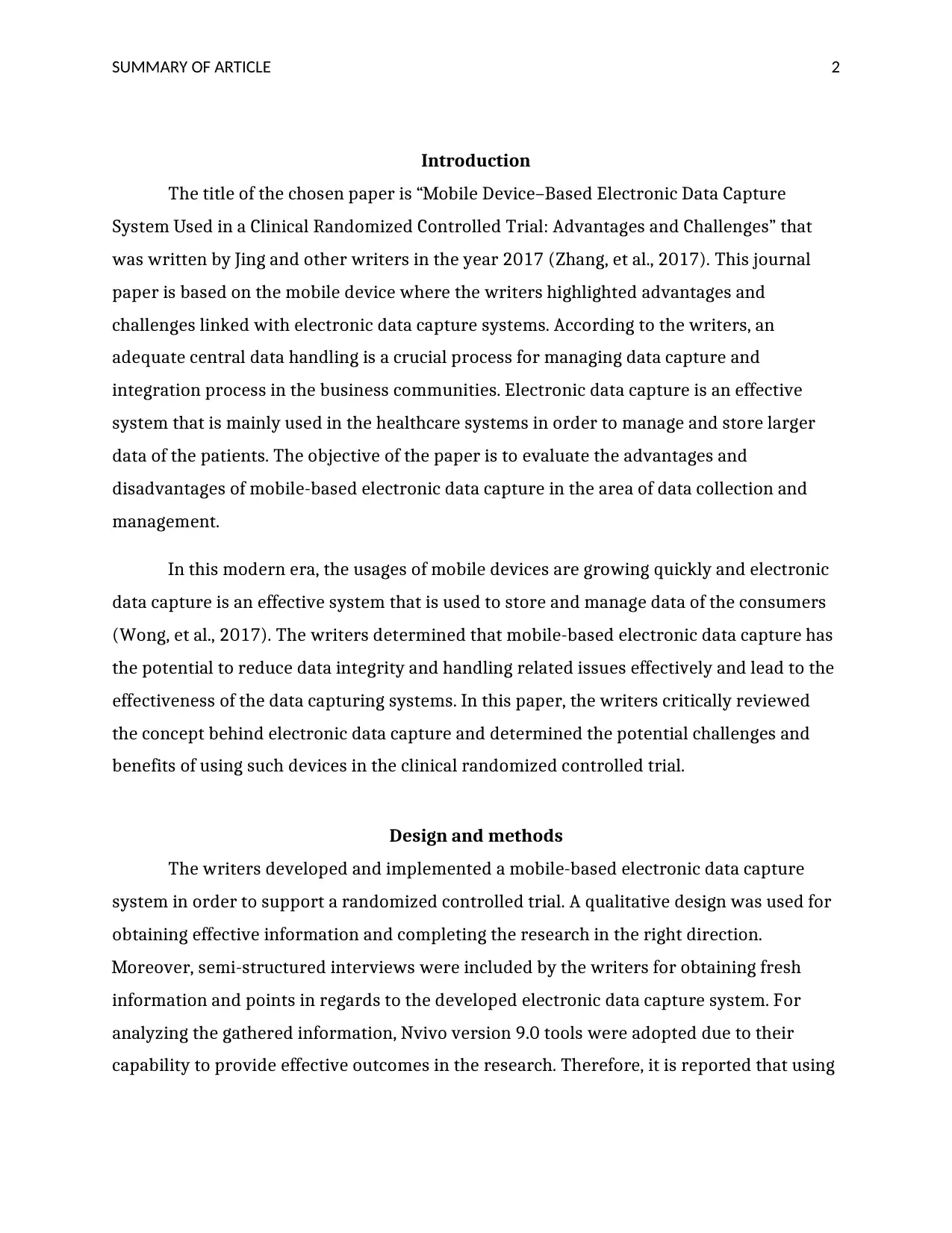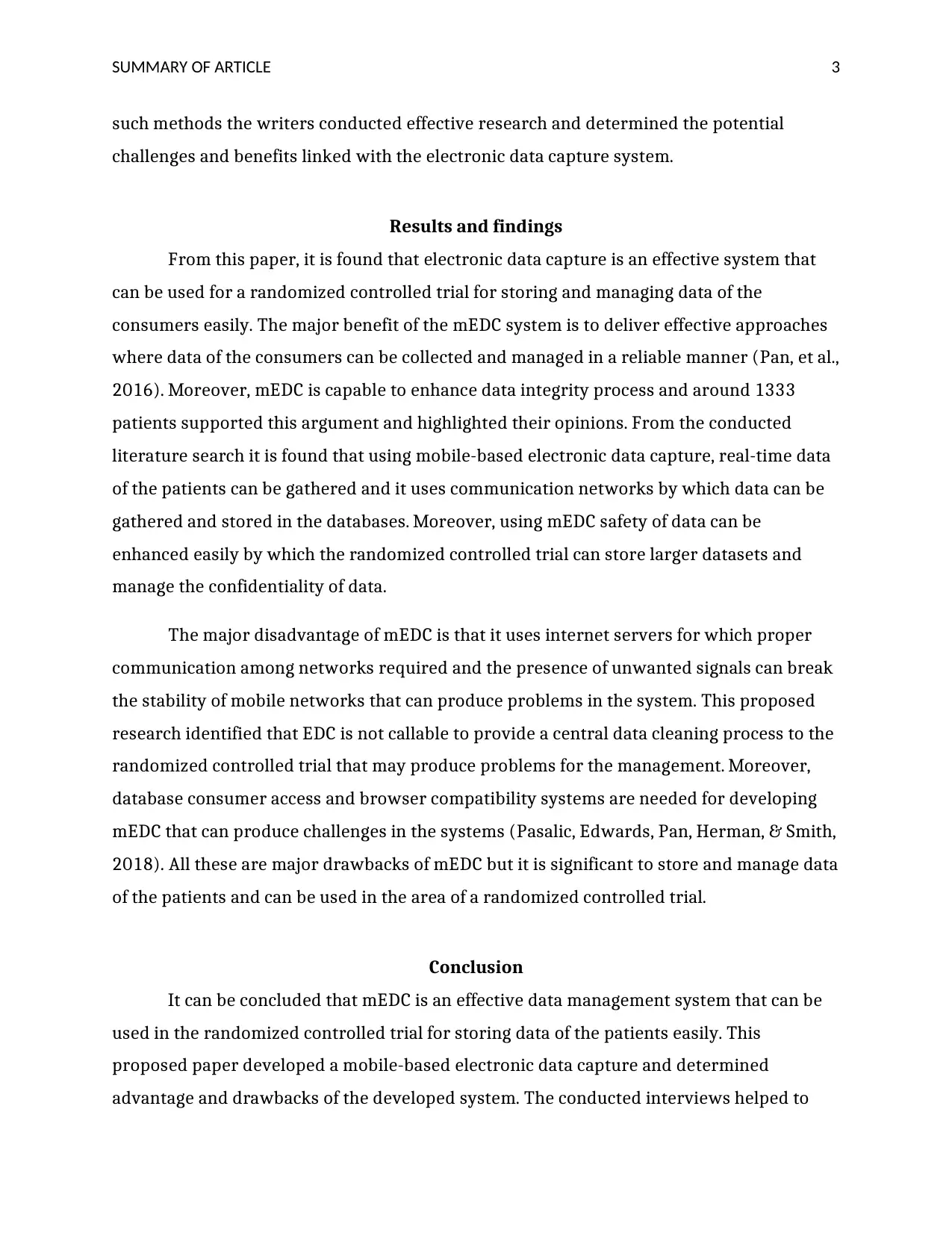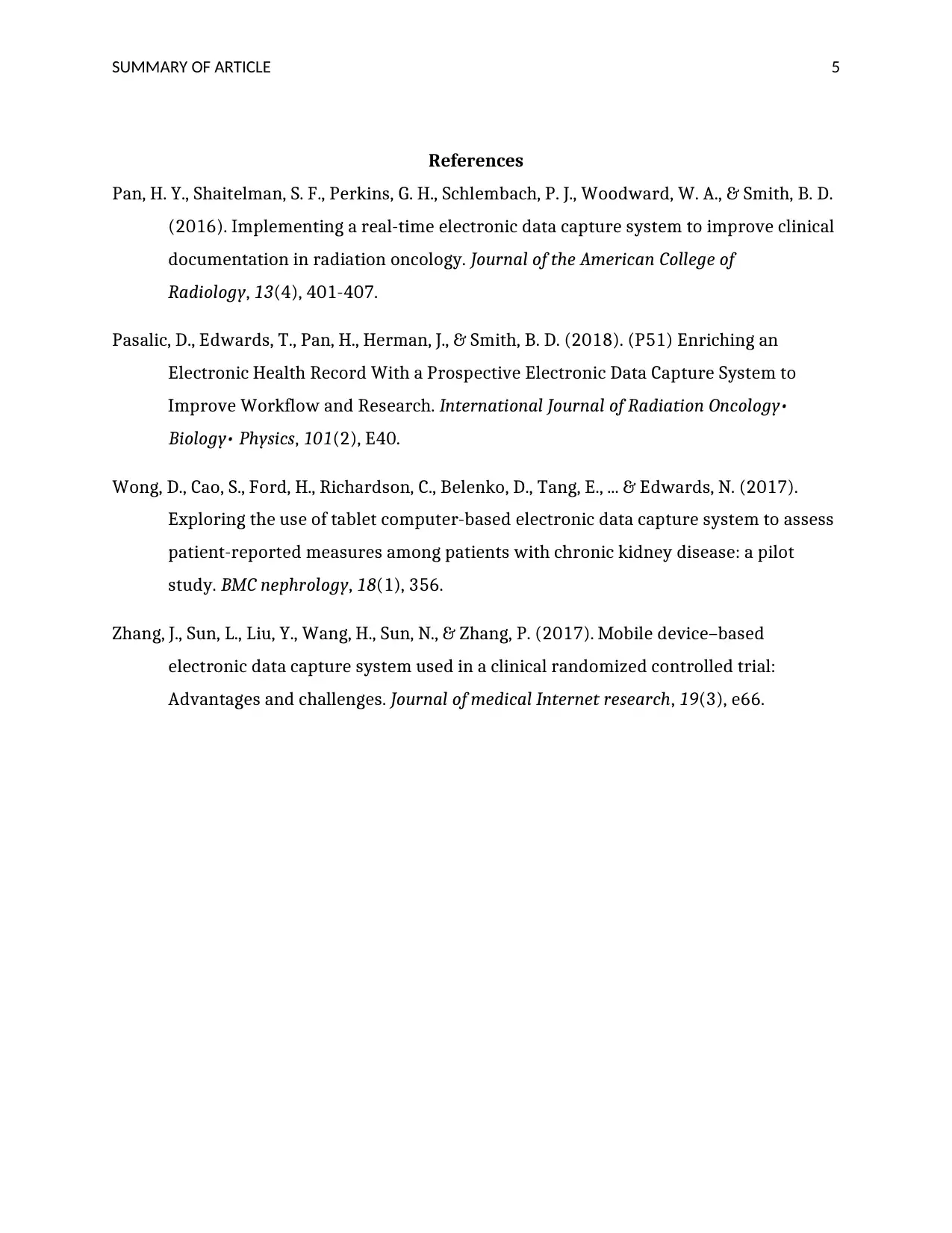Review of Mobile Device-Based Electronic Data Capture Systems
VerifiedAdded on 2022/08/12
|6
|1080
|18
Report
AI Summary
This report summarizes a research paper titled "Mobile Device–Based Electronic Data Capture System Used in a Clinical Randomized Controlled Trial: Advantages and Challenges." The paper, published in 2017, explores the benefits and drawbacks of using mobile devices for electronic data capture (EDC) in clinical trials. The study highlights the potential of mobile EDC (mEDC) to enhance data integrity and streamline data management, particularly in healthcare. The methodology involved a qualitative design with semi-structured interviews, analyzed using NVivo. The findings reveal that mEDC can facilitate real-time data collection and improve data security. However, challenges include the reliance on stable internet connectivity and the need for database consumer access and browser compatibility. The paper concludes that while mEDC offers significant advantages for data management in randomized controlled trials, further research is needed to address the identified challenges. The report offers insights into mEDC, focusing on its applications, strengths, and weaknesses in clinical research settings.

SUMMARY OF ARTICLE 0
Summary of Article
Mobile Device–Based Electronic Data Capture System Used in a
Clinical Randomized Controlled Trial: Advantages and Challenges
Summary of Article
Mobile Device–Based Electronic Data Capture System Used in a
Clinical Randomized Controlled Trial: Advantages and Challenges
Paraphrase This Document
Need a fresh take? Get an instant paraphrase of this document with our AI Paraphraser

SUMMARY OF ARTICLE 1
Table of Contents
Introduction.................................................................................................................................................2
Design and methods....................................................................................................................................2
Results and findings.....................................................................................................................................3
Conclusion...................................................................................................................................................3
References...................................................................................................................................................5
Table of Contents
Introduction.................................................................................................................................................2
Design and methods....................................................................................................................................2
Results and findings.....................................................................................................................................3
Conclusion...................................................................................................................................................3
References...................................................................................................................................................5

SUMMARY OF ARTICLE 2
Introduction
The title of the chosen paper is “Mobile Device–Based Electronic Data Capture
System Used in a Clinical Randomized Controlled Trial: Advantages and Challenges” that
was written by Jing and other writers in the year 2017 (Zhang, et al., 2017). This journal
paper is based on the mobile device where the writers highlighted advantages and
challenges linked with electronic data capture systems. According to the writers, an
adequate central data handling is a crucial process for managing data capture and
integration process in the business communities. Electronic data capture is an effective
system that is mainly used in the healthcare systems in order to manage and store larger
data of the patients. The objective of the paper is to evaluate the advantages and
disadvantages of mobile-based electronic data capture in the area of data collection and
management.
In this modern era, the usages of mobile devices are growing quickly and electronic
data capture is an effective system that is used to store and manage data of the consumers
(Wong, et al., 2017). The writers determined that mobile-based electronic data capture has
the potential to reduce data integrity and handling related issues effectively and lead to the
effectiveness of the data capturing systems. In this paper, the writers critically reviewed
the concept behind electronic data capture and determined the potential challenges and
benefits of using such devices in the clinical randomized controlled trial.
Design and methods
The writers developed and implemented a mobile-based electronic data capture
system in order to support a randomized controlled trial. A qualitative design was used for
obtaining effective information and completing the research in the right direction.
Moreover, semi-structured interviews were included by the writers for obtaining fresh
information and points in regards to the developed electronic data capture system. For
analyzing the gathered information, Nvivo version 9.0 tools were adopted due to their
capability to provide effective outcomes in the research. Therefore, it is reported that using
Introduction
The title of the chosen paper is “Mobile Device–Based Electronic Data Capture
System Used in a Clinical Randomized Controlled Trial: Advantages and Challenges” that
was written by Jing and other writers in the year 2017 (Zhang, et al., 2017). This journal
paper is based on the mobile device where the writers highlighted advantages and
challenges linked with electronic data capture systems. According to the writers, an
adequate central data handling is a crucial process for managing data capture and
integration process in the business communities. Electronic data capture is an effective
system that is mainly used in the healthcare systems in order to manage and store larger
data of the patients. The objective of the paper is to evaluate the advantages and
disadvantages of mobile-based electronic data capture in the area of data collection and
management.
In this modern era, the usages of mobile devices are growing quickly and electronic
data capture is an effective system that is used to store and manage data of the consumers
(Wong, et al., 2017). The writers determined that mobile-based electronic data capture has
the potential to reduce data integrity and handling related issues effectively and lead to the
effectiveness of the data capturing systems. In this paper, the writers critically reviewed
the concept behind electronic data capture and determined the potential challenges and
benefits of using such devices in the clinical randomized controlled trial.
Design and methods
The writers developed and implemented a mobile-based electronic data capture
system in order to support a randomized controlled trial. A qualitative design was used for
obtaining effective information and completing the research in the right direction.
Moreover, semi-structured interviews were included by the writers for obtaining fresh
information and points in regards to the developed electronic data capture system. For
analyzing the gathered information, Nvivo version 9.0 tools were adopted due to their
capability to provide effective outcomes in the research. Therefore, it is reported that using
⊘ This is a preview!⊘
Do you want full access?
Subscribe today to unlock all pages.

Trusted by 1+ million students worldwide

SUMMARY OF ARTICLE 3
such methods the writers conducted effective research and determined the potential
challenges and benefits linked with the electronic data capture system.
Results and findings
From this paper, it is found that electronic data capture is an effective system that
can be used for a randomized controlled trial for storing and managing data of the
consumers easily. The major benefit of the mEDC system is to deliver effective approaches
where data of the consumers can be collected and managed in a reliable manner (Pan, et al.,
2016). Moreover, mEDC is capable to enhance data integrity process and around 1333
patients supported this argument and highlighted their opinions. From the conducted
literature search it is found that using mobile-based electronic data capture, real-time data
of the patients can be gathered and it uses communication networks by which data can be
gathered and stored in the databases. Moreover, using mEDC safety of data can be
enhanced easily by which the randomized controlled trial can store larger datasets and
manage the confidentiality of data.
The major disadvantage of mEDC is that it uses internet servers for which proper
communication among networks required and the presence of unwanted signals can break
the stability of mobile networks that can produce problems in the system. This proposed
research identified that EDC is not callable to provide a central data cleaning process to the
randomized controlled trial that may produce problems for the management. Moreover,
database consumer access and browser compatibility systems are needed for developing
mEDC that can produce challenges in the systems (Pasalic, Edwards, Pan, Herman, & Smith,
2018). All these are major drawbacks of mEDC but it is significant to store and manage data
of the patients and can be used in the area of a randomized controlled trial.
Conclusion
It can be concluded that mEDC is an effective data management system that can be
used in the randomized controlled trial for storing data of the patients easily. This
proposed paper developed a mobile-based electronic data capture and determined
advantage and drawbacks of the developed system. The conducted interviews helped to
such methods the writers conducted effective research and determined the potential
challenges and benefits linked with the electronic data capture system.
Results and findings
From this paper, it is found that electronic data capture is an effective system that
can be used for a randomized controlled trial for storing and managing data of the
consumers easily. The major benefit of the mEDC system is to deliver effective approaches
where data of the consumers can be collected and managed in a reliable manner (Pan, et al.,
2016). Moreover, mEDC is capable to enhance data integrity process and around 1333
patients supported this argument and highlighted their opinions. From the conducted
literature search it is found that using mobile-based electronic data capture, real-time data
of the patients can be gathered and it uses communication networks by which data can be
gathered and stored in the databases. Moreover, using mEDC safety of data can be
enhanced easily by which the randomized controlled trial can store larger datasets and
manage the confidentiality of data.
The major disadvantage of mEDC is that it uses internet servers for which proper
communication among networks required and the presence of unwanted signals can break
the stability of mobile networks that can produce problems in the system. This proposed
research identified that EDC is not callable to provide a central data cleaning process to the
randomized controlled trial that may produce problems for the management. Moreover,
database consumer access and browser compatibility systems are needed for developing
mEDC that can produce challenges in the systems (Pasalic, Edwards, Pan, Herman, & Smith,
2018). All these are major drawbacks of mEDC but it is significant to store and manage data
of the patients and can be used in the area of a randomized controlled trial.
Conclusion
It can be concluded that mEDC is an effective data management system that can be
used in the randomized controlled trial for storing data of the patients easily. This
proposed paper developed a mobile-based electronic data capture and determined
advantage and drawbacks of the developed system. The conducted interviews helped to
Paraphrase This Document
Need a fresh take? Get an instant paraphrase of this document with our AI Paraphraser

SUMMARY OF ARTICLE 4
achieve developed objectives and enhanced research quality. The writers provided depth
information in regards to the mEDC system and included reliable methods and designs for
gathering effective data. However, this paper did not highlight effective recommendations
for addressing the challenges and issues linked with the mEDC that can be included in
future research.
achieve developed objectives and enhanced research quality. The writers provided depth
information in regards to the mEDC system and included reliable methods and designs for
gathering effective data. However, this paper did not highlight effective recommendations
for addressing the challenges and issues linked with the mEDC that can be included in
future research.

SUMMARY OF ARTICLE 5
References
Pan, H. Y., Shaitelman, S. F., Perkins, G. H., Schlembach, P. J., Woodward, W. A., & Smith, B. D.
(2016). Implementing a real-time electronic data capture system to improve clinical
documentation in radiation oncology. Journal of the American College of
Radiology, 13(4), 401-407.
Pasalic, D., Edwards, T., Pan, H., Herman, J., & Smith, B. D. (2018). (P51) Enriching an
Electronic Health Record With a Prospective Electronic Data Capture System to
Improve Workflow and Research. International Journal of Radiation Oncology•
Biology• Physics, 101(2), E40.
Wong, D., Cao, S., Ford, H., Richardson, C., Belenko, D., Tang, E., ... & Edwards, N. (2017).
Exploring the use of tablet computer-based electronic data capture system to assess
patient-reported measures among patients with chronic kidney disease: a pilot
study. BMC nephrology, 18(1), 356.
Zhang, J., Sun, L., Liu, Y., Wang, H., Sun, N., & Zhang, P. (2017). Mobile device–based
electronic data capture system used in a clinical randomized controlled trial:
Advantages and challenges. Journal of medical Internet research, 19(3), e66.
References
Pan, H. Y., Shaitelman, S. F., Perkins, G. H., Schlembach, P. J., Woodward, W. A., & Smith, B. D.
(2016). Implementing a real-time electronic data capture system to improve clinical
documentation in radiation oncology. Journal of the American College of
Radiology, 13(4), 401-407.
Pasalic, D., Edwards, T., Pan, H., Herman, J., & Smith, B. D. (2018). (P51) Enriching an
Electronic Health Record With a Prospective Electronic Data Capture System to
Improve Workflow and Research. International Journal of Radiation Oncology•
Biology• Physics, 101(2), E40.
Wong, D., Cao, S., Ford, H., Richardson, C., Belenko, D., Tang, E., ... & Edwards, N. (2017).
Exploring the use of tablet computer-based electronic data capture system to assess
patient-reported measures among patients with chronic kidney disease: a pilot
study. BMC nephrology, 18(1), 356.
Zhang, J., Sun, L., Liu, Y., Wang, H., Sun, N., & Zhang, P. (2017). Mobile device–based
electronic data capture system used in a clinical randomized controlled trial:
Advantages and challenges. Journal of medical Internet research, 19(3), e66.
⊘ This is a preview!⊘
Do you want full access?
Subscribe today to unlock all pages.

Trusted by 1+ million students worldwide
1 out of 6
Related Documents
Your All-in-One AI-Powered Toolkit for Academic Success.
+13062052269
info@desklib.com
Available 24*7 on WhatsApp / Email
![[object Object]](/_next/static/media/star-bottom.7253800d.svg)
Unlock your academic potential
Copyright © 2020–2026 A2Z Services. All Rights Reserved. Developed and managed by ZUCOL.




